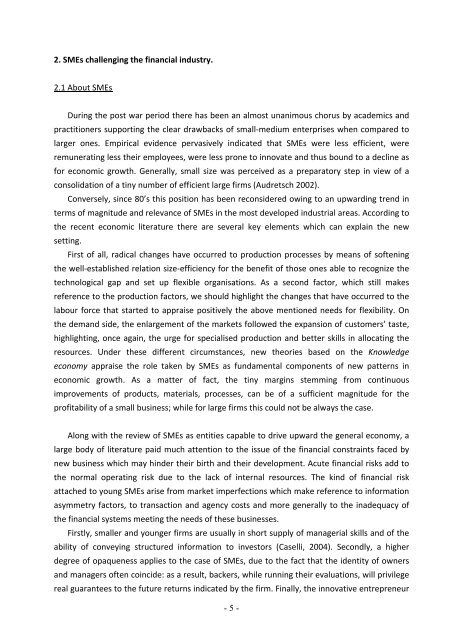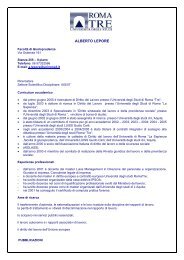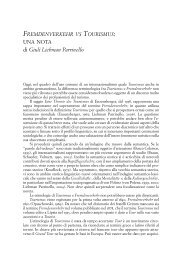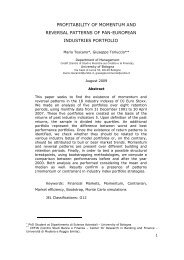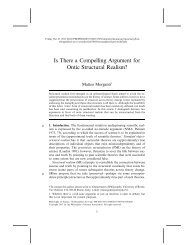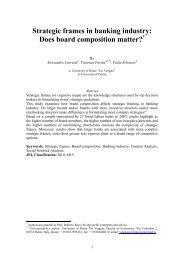Determinants and effects of Venture Capital and Private Equity ...
Determinants and effects of Venture Capital and Private Equity ...
Determinants and effects of Venture Capital and Private Equity ...
Create successful ePaper yourself
Turn your PDF publications into a flip-book with our unique Google optimized e-Paper software.
2. SMEs challenging the financial industry.<br />
2.1 About SMEs<br />
During the post war period there has been an almost unanimous chorus by academics <strong>and</strong><br />
practitioners supporting the clear drawbacks <strong>of</strong> small‐medium enterprises when compared to<br />
larger ones. Empirical evidence pervasively indicated that SMEs were less efficient, were<br />
remunerating less their employees, were less prone to innovate <strong>and</strong> thus bound to a decline as<br />
for economic growth. Generally, small size was perceived as a preparatory step in view <strong>of</strong> a<br />
consolidation <strong>of</strong> a tiny number <strong>of</strong> efficient large firms (Audretsch 2002).<br />
Conversely, since 80’s this position has been reconsidered owing to an upwarding trend in<br />
terms <strong>of</strong> magnitude <strong>and</strong> relevance <strong>of</strong> SMEs in the most developed industrial areas. According to<br />
the recent economic literature there are several key elements which can explain the new<br />
setting.<br />
First <strong>of</strong> all, radical changes have occurred to production processes by means <strong>of</strong> s<strong>of</strong>tening<br />
the well‐established relation size‐efficiency for the benefit <strong>of</strong> those ones able to recognize the<br />
technological gap <strong>and</strong> set up flexible organisations. As a second factor, which still makes<br />
reference to the production factors, we should highlight the changes that have occurred to the<br />
labour force that started to appraise positively the above mentioned needs for flexibility. On<br />
the dem<strong>and</strong> side, the enlargement <strong>of</strong> the markets followed the expansion <strong>of</strong> customers’ taste,<br />
highlighting, once again, the urge for specialised production <strong>and</strong> better skills in allocating the<br />
resources. Under these different circumstances, new theories based on the Knowledge<br />
economy appraise the role taken by SMEs as fundamental components <strong>of</strong> new patterns in<br />
economic growth. As a matter <strong>of</strong> fact, the tiny margins stemming from continuous<br />
improvements <strong>of</strong> products, materials, processes, can be <strong>of</strong> a sufficient magnitude for the<br />
pr<strong>of</strong>itability <strong>of</strong> a small business; while for large firms this could not be always the case.<br />
Along with the review <strong>of</strong> SMEs as entities capable to drive upward the general economy, a<br />
large body <strong>of</strong> literature paid much attention to the issue <strong>of</strong> the financial constraints faced by<br />
new business which may hinder their birth <strong>and</strong> their development. Acute financial risks add to<br />
the normal operating risk due to the lack <strong>of</strong> internal resources. The kind <strong>of</strong> financial risk<br />
attached to young SMEs arise from market imperfections which make reference to information<br />
asymmetry factors, to transaction <strong>and</strong> agency costs <strong>and</strong> more generally to the inadequacy <strong>of</strong><br />
the financial systems meeting the needs <strong>of</strong> these businesses.<br />
Firstly, smaller <strong>and</strong> younger firms are usually in short supply <strong>of</strong> managerial skills <strong>and</strong> <strong>of</strong> the<br />
ability <strong>of</strong> conveying structured information to investors (Caselli, 2004). Secondly, a higher<br />
degree <strong>of</strong> opaqueness applies to the case <strong>of</strong> SMEs, due to the fact that the identity <strong>of</strong> owners<br />
<strong>and</strong> managers <strong>of</strong>ten coincide: as a result, backers, while running their evaluations, will privilege<br />
real guarantees to the future returns indicated by the firm. Finally, the innovative entrepreneur<br />
- 5 -


